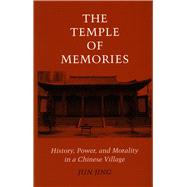
Note: Supplemental materials are not guaranteed with Rental or Used book purchases.
Purchase Benefits
Looking to rent a book? Rent The Temple of Memories: History, Power, and Morality in a Chinese Village [ISBN: 9780804727570] for the semester, quarter, and short term or search our site for other textbooks by Jing, Jun. Renting a textbook can save you up to 90% from the cost of buying.
| Acknowledgments | p. vii |
| Introduction: A Study of Social Memory | p. 1 |
| Memory of Historical Possibilities | p. 23 |
| Memory of Revolutionary Terror | p. 45 |
| Memory of Communal Trauma | p. 69 |
| Memory of Local Animosity | p. 87 |
| Memory of Ritual Language | p. 101 |
| Memory of Genealogical Retainers | p. 115 |
| Memory of Cultural Symbols | p. 144 |
| Finding Memories in Gansu | p. 163 |
| Notes | p. 177 |
| Character List | p. 205 |
| Index | p. 207 |
| Table of Contents provided by Publisher. All Rights Reserved. |
The New copy of this book will include any supplemental materials advertised. Please check the title of the book to determine if it should include any access cards, study guides, lab manuals, CDs, etc.
The Used, Rental and eBook copies of this book are not guaranteed to include any supplemental materials. Typically, only the book itself is included. This is true even if the title states it includes any access cards, study guides, lab manuals, CDs, etc.